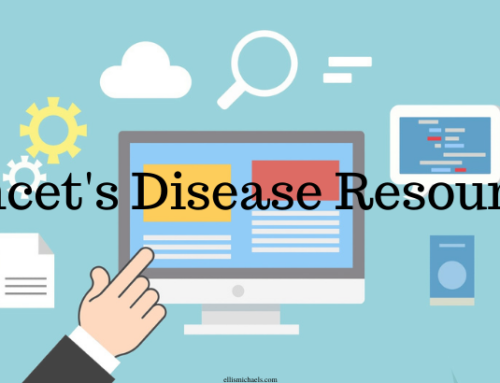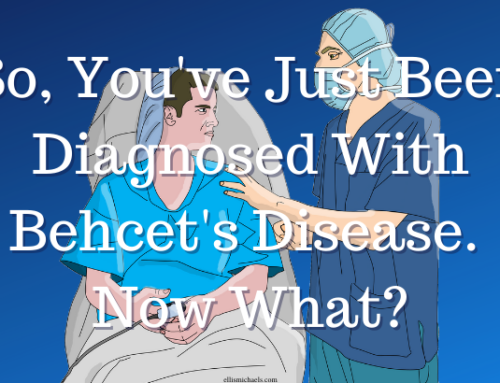No one wants to hear that they have a rare, painful, lifelong illness. I certainly didn’t want to hear that I had Behcet’s disease when I was diagnosed at the age of sixteen. The past twenty-four years since my diagnosis have been filled with ups and downs, struggles and setbacks. However, it hasn’t been all bad.
Okay, I’m not going to lie: it’s been mostly bad. But believe it or not, there are silver linings to having a chronic autoimmune disease. Sometimes you have to look really, really hard to find them. Sometimes all the negative aspects of having a chronic illness make it nearly impossible to see the positives, but they are there. And if you look hard enough, you’ll find them.
What Are Autoimmune Diseases?
Table of Contents
Before we get to the silver linings of having an autoimmune disease, let’s take a quick look at what these illnesses are. In a nutshell, they’re conditions where the immune system mistakenly attacks the body. Normally, the immune system’s job is to fight off foreign threats like harmful viruses and bacteria. Autoimmunity is when the immune systems doesn’t just go to war with foreign pathogens – it also goes to war with healthy cells and tissues.
More than 100 autoimmune diseases have been identified.1 Rheumatoid arthritis, lupus, psoriasis, multiple sclerosis, and inflammatory bowel disease are among the most common. My diagnosis, Behcet’s disease, is not. In the United States, Behcet’s is estimated to affect less than 0.01% of the population.2 Lucky me!
However, autoimmune disease rates in general are much higher. It’s estimated that about 5% of people (1 in 20) have an autoimmune condition.3 Women are the unlucky ones here. Autoimmune diseases are more than twice as common in women than in men.
Whether you’re a man, woman, or child, living with an autoimmune disease isn’t fun. Life can be challenging enough without having to worry about your own body attacking itself. But believe it or not, there are some disguised blessing to having an autoimmune disease.
5 Silver Linings of Having an Autoimmune Disease
1. So Much Knowledge
“The only source of knowledge is experience.” – Albert Einstein
 You can learn a lot from having an autoimmune disease. Sure, you’ll learn some not-so-fun things like what it feels like to have an inflamed [insert body part here]. You’ll find out just how long you can sit in a doctor’s waiting room before the threads of sanity start to unravel. And you’ll learn lots of other stuff you’d probably rather not know.
You can learn a lot from having an autoimmune disease. Sure, you’ll learn some not-so-fun things like what it feels like to have an inflamed [insert body part here]. You’ll find out just how long you can sit in a doctor’s waiting room before the threads of sanity start to unravel. And you’ll learn lots of other stuff you’d probably rather not know.
However, you’ll also gain all sorts of useful knowledge on a variety of subjects. Take medicine, for example. Most people know very little about their own bodies and how they work. But having an autoimmune disease – especially a multi-system one like Behcet’s – can be like taking an anatomy and physiology course. Every new body part that gets inflamed is an opportunity to learn about what it does and how it works.
From living with Behcet’s disease all these years, I’ve learned a ton about medicine, nutrition, the healthcare system (which is far sicker than I’ve ever been), and many other topics that I wouldn’t have otherwise. I’d say I’ve learned as much about the human body from having an autoimmune disease as I did from college or from my years as an EMT. I now know dozens of words that end with -itis (because I’ve experienced them), many of the different types of medical specialist (because I’ve been to them), and so much more.
2. A Deeper Connection
“Invisible threads are the strongest ties.” – Friedrich Nietzsche
 In the years following my diagnosis in 1996, I felt incredibly lonely. Though the internet did already exist, social media didn’t. For a long time, I felt like I was the only person on the planet with Behcet’s disease. There was no one to reach out to, no way to connect. Then Facebook, Twitter, Reddit, and other social media came along and changed everything.
In the years following my diagnosis in 1996, I felt incredibly lonely. Though the internet did already exist, social media didn’t. For a long time, I felt like I was the only person on the planet with Behcet’s disease. There was no one to reach out to, no way to connect. Then Facebook, Twitter, Reddit, and other social media came along and changed everything.
Over the past decade, I’ve developed meaningful relationships with people from around the world who have Behcet’s and other autoimmune diseases. While I’m fortunate enough to have a lot of good friends, there’s something very special about these friends. As much as my healthy friends might want to, they couldn’t possibly understand what it’s like to have an autoimmune disease. But people with the same or similar diagnosis do understand.
Connecting with others who share your diagnosis is like being part of a special club. Granted, it’s not a club most people would want to belong to. But if you’ve already got a lifetime membership, you might as well take advantage of the club’s benefits. And the greatest benefit is the sense of connectedness and belonging you’ll feel from talking to others who share your diagnosis.
3. Live Life To The Fullest
“One way to get the most out of life is to look upon it as an adventure.” – William Feather
 You’d think having an autoimmune disease would restrict how fully you’re able to live life – and in many ways you’d be right. When you’re often (or always) in pain, it can be hard to want to do much of anything. But having a body that constantly attacks itself can also be incredibly motivating.
You’d think having an autoimmune disease would restrict how fully you’re able to live life – and in many ways you’d be right. When you’re often (or always) in pain, it can be hard to want to do much of anything. But having a body that constantly attacks itself can also be incredibly motivating.
Living with Behcet’s disease has lit a fire under my butt like nothing else ever could. Knowing I could wake up tomorrow blind, deaf, paralyzed, or not at all (all very real possibilities with Behcet’s) makes me want to live today like it might be my last – because it could be.
For those of us with autoimmune diseases, good days can be few and far between. So when we actually feel half-decent, we often want to get out and conquer the world. And that brings us to our next silver lining.
4. Appreciate The Big and Little Things
“Health is the crown on the well person’s head that only the ill person can see.” – Robin Sharma
 Few people appreciate what they have while they have it. It’s often through loss that we finally come to appreciate what we once had. But when you’re living with an autoimmune disease, you’ll find yourself learning to appreciate lots of things others take for granted.
Few people appreciate what they have while they have it. It’s often through loss that we finally come to appreciate what we once had. But when you’re living with an autoimmune disease, you’ll find yourself learning to appreciate lots of things others take for granted.
If you’re used to feeling lousy most of the time, it’ll make you appreciate those rare days when you actually feel decent. When your pain level is usually at a 6, you’ll feel grateful on days when it’s only a 4. Living with an autoimmune disease gives you perspective that most healthy people don’t have. You learn to appreciate things – both big and small – they usually take for granted.
It’s often the little things I find myself the most thankful for. After nearly losing vision in my left eye over 20 years ago, I now look at sunsets differently – and not because of the residual scarring in my retina. Even though they happen 365 times a year, I still appreciate every time I get to watch the sun disappear over the horizon – because it could be my last.
5. Unconditional Compassion
“Compassion is to look beyond your own pain, to see the pain of others.” – Yasmin Mogahed
 When you’re in pain, it can be hard to focus on anything other than how awful you feel. But the chronic pain and suffering that often goes hand-in-hand with having an autoimmune disease can teach you to be a lot more compassionate toward the pain and suffering of others.
When you’re in pain, it can be hard to focus on anything other than how awful you feel. But the chronic pain and suffering that often goes hand-in-hand with having an autoimmune disease can teach you to be a lot more compassionate toward the pain and suffering of others.
Before I was diagnosed, if I met someone who was rude I’d think, “What a jerk.” Now if I meet someone who’s not-so-nice I think, “I wonder what’s going on with them to make them act that way. I wonder what horrible things have happened or are happening in their life to make them so miserable.”
We all struggle. A lot of the time we get so caught up in our own lives that we don’t see what others are going through. This is especially true when what they’re going through is invisible, as is so often the case with many autoimmune diseases. You can’t know what’s going on with them any better than they know what’s going on with you.
Maybe that guy who cut you off in traffic just got fired from his job. Maybe he just lost one of his children in a freak accident. Or maybe he’s got a chronic illness and today his pain level is a hard 9. You never know. For those of us living with autoimmune diseases, we often learn to be more compassionate toward others because we understand this. We look beyond our own pain and are able to see the pain of others.
Conclusion
If I could make my illness go away, I’d do it in a heartbeat. I wouldn’t wish Behcet’s disease on my worst enemy (okay, maybe I would if I really didn’t like them). Over the years, it’s wreaked havoc on every aspect of my life. But it’s also opened doors I never would’ve had the chance to walk through otherwise.
Living with a chronic illness can be horrible. But if you look hard enough – sometimes really, really hard – you’ll find the silver linings of having an autoimmune disease.
To learn all the dirty, dark details of my story, I wrote a book about it. It’s called Finding Happiness Through Pain and Embarrassment: My Life With Behcet’s Disease – A Memoir. And it’s available wherever books are sold.
Join the Ellis Michaels mailing list to get notified about new Behcet's disease articles and publications, up-to-date news and info about this rare illness, and more.
References
1Autoimmune disease list. (n.d.). American Autoimmune Related Diseases Association: https://www.aarda.org/diseaselist/
2Muruganandam, M., Rolle, N., Sibbitt Jr., et al. (2019). Characteristics of Behcet’s disease in the American Southwest. Seminars in Arthritis & Rheumatism, 49(2):296-302.
3Hayter, S., & Cook, M. (2012). Updated assessment of the prevalence, spectrum, and case definition of autoimmune disease. Autoimmunity Reviews, 11(10):754-65.







Leave a Reply